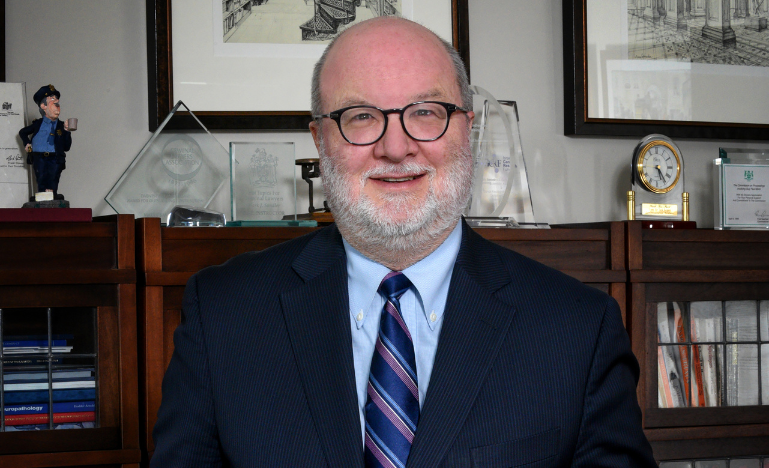Combattre une vague de haine
Confronté à une résurgence d’antisémitisme, l’avocat « retraité » Mark Sandler a lancé une alliance visant à éduquer, à encourager les échanges et à modifier les préjugés

Le 2 juillet 1964, Mark Sandler n’avait que neuf ans quand sa mère l’a incité à regarder à la télévision la signature par le président américain Lyndon Johnson du Civil Rights Act.
Quelques années plus tard, en tant qu’élève de 6e année, Me Sandler a choisi la discrimination et la ségrégation comme sujet lors de sa participation à un concours d’art oratoire tenu à l’échelle de la ville.
Il a fini par avoir une carrière fort applaudie de 43 ans en tant que juriste spécialisé en droit pénal et droits de la personne. Maintenant, pendant ses années de « retraite », il s’efforce de rassembler les gens pour combattre la vague croissante de haine et d’antisémitisme au Canada.
Selon Me Sandler, c’est grâce à l’influence de sa mère monoparentale, qui n’avait pas fait d’études supérieures, mais qui était une grande lectrice, qu’il est devenu un militant.
« Les fondements de ce que je ressens à ce sujet viennent vraiment d’elle et des valeurs qu’elle m’a inculquées. Ça paraît ringard, mais c’est ainsi que ça s’est passé », a-t-il dit lors d’une entrevue dans le bureau de sa maison sur le bord d’un lac de la région de Toronto.
Me Sandler est un vétéran dans la lutte contre l’antisémitisme, le racisme et la haine. Son combat, qui a débuté au début des années 1980, l’a amené devant des comités parlementaires et devant la Cour suprême du Canada.
En plus de sa pratique du droit, il est un ancien membre du Tribunal des droits de la personne de l’Ontario. Il a aussi été président national et avocat principal de la Ligue des droits de la personne B’nai Brith, et il a collaboré avec la police et divers groupes religieux pour combattre la haine. Il a également agi comme avocat ou conseiller dans plus de vingt enquêtes et examens publics.
Me Sandler a renoué avec l’action après avoir vu l’explosion d’antisémitisme et de haine contre les Juifs au Canada lorsque des membres du Hamas ont fait irruption en Israël le 7 octobre 2023, tuant 1 500 personnes et faisant 251 otages.
« J’étais bien installé à la retraite, mais je ne pouvais pas rester sur la touche et simplement regarder ce qui se passait. L’antisémitisme manifeste a simplement donné la permission à chaque monstre rempli de haine de se manifester », dit-il.
Me Sandler est souvent un critique sévère de la politique du gouvernement israélien et est partisan d’une solution à deux États, mais il ne s’attendait jamais à voir des gens, y compris des alliés avec lesquels il a travaillé par le passé, célébrer dans les rues les agissements du Hamas.
« C’est ce qui a provoqué ma réaction. »
Me Sandler est consterné par les allégations de maquillage en rose de la communauté LGBTQ (en anglais seulement), par l’incrédulité de nombreuses féministes à l’égard des viols de femmes et d’enfants juifs, et par la justification du meurtre et de la violence parmi les militants de la justice sociale.
Toutefois, ce qui a vraiment mis le feu aux poudres, c’est une lettre signée par 74 étudiants en droit de l’Université métropolitaine de Toronto, dans laquelle ceux-ci déclaraient être solidaires à « toutes les formes de résistance palestinienne et avec les efforts de libération » et affirmaient qu’« Israël n’est pas un pays, mais une marque de colonisateurs ».
Les troubles observés sur des campus de partout au Canada l’ont poussé à créer une initiative nationale de dialogue respectueux. Inspirée par les efforts des associations musulmanes et juives d’étudiants en droit de l’Université d’Ottawa pour diffuser un message d’unité, de tolérance et de respect, Me Sandler a voulu rassembler la communauté juridique pour rejeter sans équivoque toutes les manifestations d’antisémitisme et d’islamophobie.
Un de ses premiers alliés fut Bonnie Goldberg, ancienne doyenne adjointe de la faculté de droit de l’Université de Toronto, qui occupe maintenant le poste de présidente d’enquête auprès du coroner en chef de l’Ontario.
« L’approche de Me Sandler reconnaît que notre cause commune est la promotion de la primauté du droit, le dialogue respectueux et la pensée critique », affirme Mme Goldberg, qui a travaillé avec celui-ci pour présenter l’initiative à des facultés de droit de partout au pays.
Même s’ils ne se connaissaient pas encore, Mme Goldberg dit qu’elle a rapidement appris « qu’il n’y a presque personne dans la communauté juridique qui ne répondra pas à l’appel de Me Sandler ».
Tout aussi important, elle a aussi découvert que Me Sandler est un « maître boulanger dont les babkas sont légendaires ».
Dès le début, Me Sandler savait qu’il avait besoin d’alliés extérieurs à la communauté juive pour exercer une réelle incidence. Parmi ceux qui ont répondu à son appel figurent Michael Osborne, président du groupe du droit de la concurrence chez Cozen O’Connor, et l’ancien juge de la Cour d’appel de l’Ontario Harry LaForme, qu’il connaît tous deux depuis des décennies.
Le juge LaForme dit de Me Sandler qu’il est un « gars merveilleux » et tout ce qu’un avocat devrait être. Le juge LaForme, membre des Mississaugas of the New Credit First Nation et premier Autochtone à occuper un siège à une cour d’appel au Canada, était profondément ému par la haine qu’il percevait. Il a exprimé sa compréhension de l’importance et de la puissance de l’alliance. Il s’est vite rallié à Me Sandler pour travailler avec lui, participant à des réunions avec des doyens de facultés de droit, des politiciens et d’autres intervenants, et rédigeant en collaboration un mandat de député pour les audiences du comité parlementaire sur l’antisémitisme sur les campus en y expliquant son point de vue.
« Maintenant, ils m’appellent le sioniste autochtone, dit le juge LaForme. Je ne suis pas en désaccord avec cela, si le sionisme traite de votre propre terre et de votre propre droit à l’autodétermination ou à l’autorégulation de ce territoire. C’est ce dont, selon moi, traite la réconciliation. »
Toutefois, alors que les camps propalestiniens se multiplient sur les campus et que les manifestations sont de plus en plus fréquentes dans les rues, que les attaques contre les entreprises juives, les synagogues et les écoles deviennent de plus en plus effrayantes, et que la désinformation s’intensifie, Me Sandler croit fermement qu’il est temps de prendre des mesures qui s’adressent à un public plus large que la communauté juive et la communauté juridique canadiennes. Son but ultime est d’atteindre les personnes « non affiliées » qui n’ont pas adopté de points de vue sur le conflit entre Israël et le Hamas, et ceux qui « n’ont pas une compréhension approfondie des nuances » de la situation au Moyen-Orient.
Pour faire de son plan d’ensemble une réalité, Me Sandler a mis à profit ses compétences reconnues en réseautage. En l’espace de quelques mois, il a réussi à rassembler plus de trente groupes pour lancer au cours de l’été l’Alliance of Canadians Combatting Antisemitism (en anglais seulement). À l’origine, l’alliance s’est formée autour des audiences parlementaires de mai sur l’antisémitisme au Canada. Elle comprend des groupes de défense juifs bien connus, tels que le Centre consultatif des relations juives et israéliennes, ainsi que diverses associations juridiques, comme Lawyers for Secure Immigration et Lawyers Combatting Antisemitism.
Des organisations issues d’un éventail plus large, y compris des universitaires, des femmes, des associations médicales et des groupes de défense des droits de la personne, font également partie de l’alliance, tout comme le Conseil des musulmans contre l’antisémitisme et le tout nouveau Syndicat canadien des étudiants juifs (CUJS).
Me Sandler a tendu la main à d’autres représentants des communautés sikhe, hindoue et italienne, entre autres, dans l’espoir de les rallier à la cause.
L’alliance vise à éduquer et à favoriser le dialogue par le biais de billets de blogue, de tables rondes et de symposiums. Me Sandler croit que, pour que les perceptions changent, les gens doivent recommencer à s’écouter les uns les autres.
« Vous n’avez pas à être d’accord avec lui, mais ne diabolisez pas votre adversaire. Écoutez ce qu’il a à dire. »
Michael Osborne a rapidement appuyé les efforts de Me Sandler, convaincu que « l’antisémitisme n’est pas seulement un problème juif, mais un problème de société qui nécessite une réponse plus large. Pour moi, en tant que catholique, c’est une expression de ma foi », dit-il. Il n’est donc pas « facultatif » de se tenir aux côtés de ses « frères et sœurs » juifs.
Le juge LaForme dit que Me Sandler a travaillé jour et nuit sur ce projet.
« Je ne sais pas s’il lui arrive de dormir. Il est tellement engagé. C’est le genre de gars qui avance sans cesse et il veut s’appuyer sur des faits. »
Nati Pressman, présidente et fondatrice du CUJS et étudiante de quatrième année à l’Université Queen’s, attribue à Me Sandler le mérite d’avoir réuni tant d’organismes communautaires. Elle est d’avis qu’un trop grand nombre d’entre eux travaillent souvent en vase clos et ne collaborent pas.
« Cela ne signifie pas que nous avons tous le même objectif, ou que nous avons tous la même approche, mais, à tout le moins, nous sommes tous sur la même longueur d’onde, dit-elle. Pour Me Sandler, la création de cette culture est quelque chose de vraiment phénoménal. »
L’aide de Me Sandler a également été essentielle pour le lancement de son organisation naissante, dit Nati Pressman, soulignant qu’il a offert son soutien à de nombreux niveaux, y compris pour la mise en relation avec un autre avocat qui a aidé le groupe pro bono à obtenir le statut d’œuvre de bienfaisance.
Il n’hésite pas non plus à conseiller les gouvernements de tous les ordres sur ce qu’ils peuvent faire pour contrer la montée de la haine alors que des gens et des organisations colportent l’extrémisme en toute impunité. Me Sandler croit que les gouvernements doivent traiter cette situation comme une urgence et suivre le cheminement des flux financiers pour mettre fin au financement et au blanchiment d’argent liés à l’extrémisme.
Si les politiciens ou les forces de l’ordre ignorent les mesures qu’ils peuvent prendre contre les radicaux, il leur suffit de le lui demander et il se présentera avec une page de points soutenus par la loi pour les convaincre de passer à l’action.
Me Sandler dit que les gens trouvent cela très revigorant lorsqu’il arrive et qu’il dit : « Voici le projet de loi que vous pouvez utiliser. Voici l’article. Voici ce que je propose que vous fassiez. Voici les preuves pour justifier pourquoi cela devrait être fait. »


